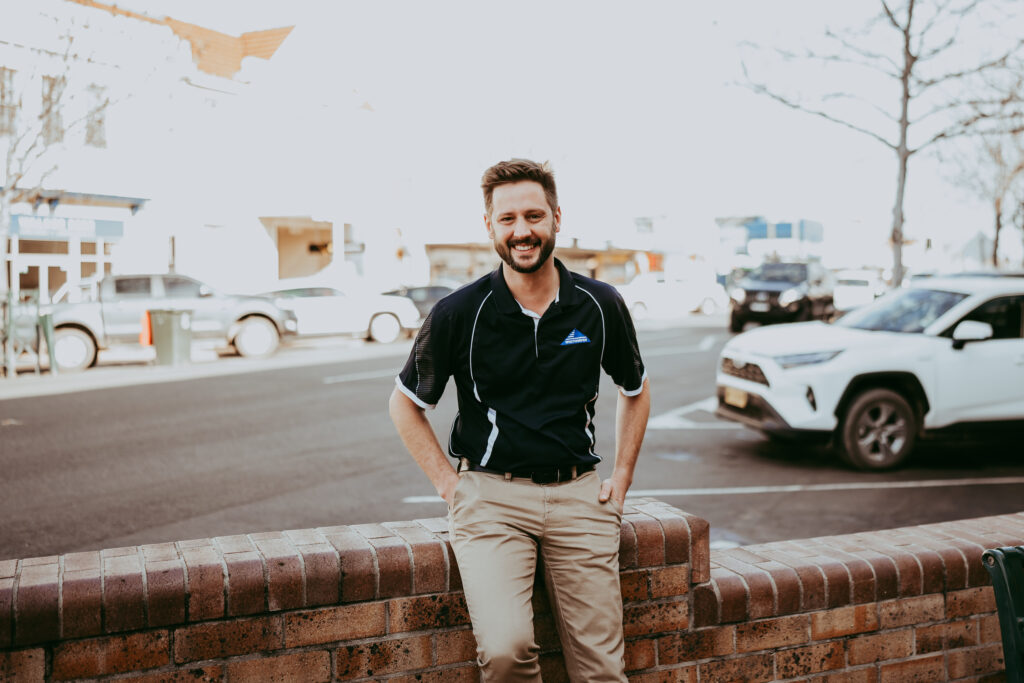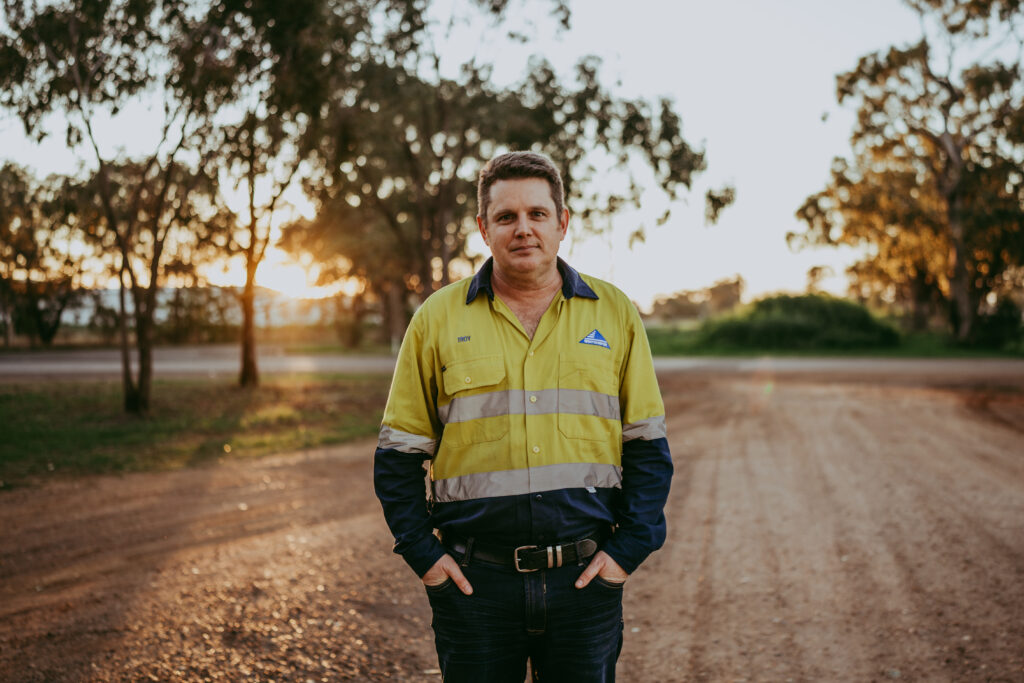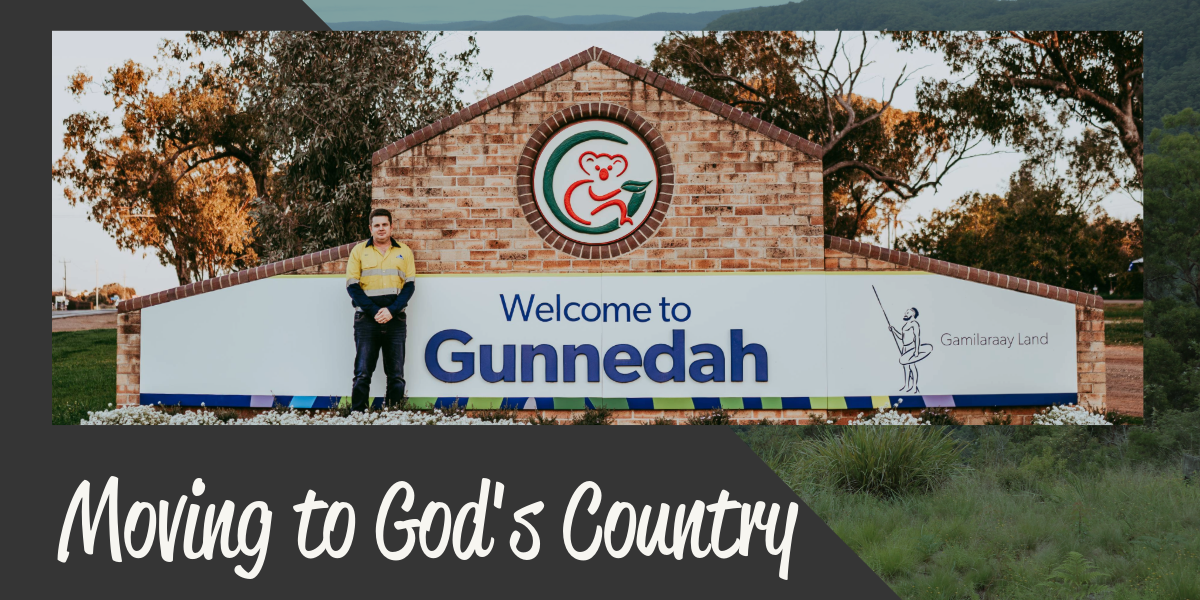Whitehaven is one of the New England’s largest employers, and unlike the Hunter coal mines facing ‘the transition’, will be for decades to come.
Attracting staff from all over the world, as well as providing good career paths for locals, Whitehaven has made a local workforce and a better quality of life for their people a priority – and it shows. We spoke to two of the imports who have relocated to Gunnedah, and it seems whether you’re driving a truck or a desk, there’s a good life on offer in the New England.
Meet Jabin

Community Relations Manager Jabin de Keizer was new to mining when he joined Whitehaven, having previously worked in construction.
“We produce something that society needs. We need energy, we still need coal.”
“So it’s great to be part of a company that does that, and I get the opportunity to just talk to lots of people and understand what they’re doing, and that’s that’s a pretty special role to to be able to do.”
Jabin spends a lot of time talking to farmers and hearing what they’re doing in their businesses, and says he really enjoys learning and understanding how the two industries cooperate and work in close proximity together.
“I really do like the job. I found it to be kind of appropriately challenging and rewarding. And Whitehaven, in my experience, has been a great company to work for,” Jabin said.
He and his family moved from Springwood in the Blue Mountains to Gunnedah for the job and a better lifestyle, with the move largely driven by family concerns.
“So we’ve got a boy who’s eight, then girls who are six and four, and twins.”
“Twins was the kicker, that required a few lifestyle changes,” Jabin said.
With five kids under the age of eight, the ability to have a big home, lots of space, and a decent income so his wife can stay home were all big ticks for Jabin.
Despite having some obvious constraints on their housing options with such a large family, Jabin said they didn’t have much trouble finding a house.
“We found the process pretty painless, really, we managed to buy a house.”
“Work was pretty supportive through the process, they gave us temporary accommodation while we’re getting ourselves sorted out,” he said.
“We probably looked at six houses that were on the market at the time, but we were just aware that we had to move pretty quickly, like stocks seem to be moving pretty quickly at the time.”
“So once we saw one that we liked, we just put the offer in. And that was it.”
Meet Troy

Troy Hartas has moved many times in his career that included 24 years in the Navy.
This time, he was looking for a more permanent move to be closer to family and landed in Gunnedah, after a stint in a mine in Mount Isa, and is working as a training coordinator on the Maules Creek mine.
“I get the bus in to work, which is great so you can unwind in and out to take that, though it’s a beautiful drive, beautiful country,” Troy said.
“The people I work with, which are which are a reflection of the people in the area, are amazing. My colleagues are phenomenal, just really great people and I like coming to work.”
Troy’s wife has also found work in town at a local restaurant and made friends, including connecting with the local Asian community (being Vietnamese herself). Meanwhile Troy’s French Bulldog John is loving the long walks in the new neighbourhood.
“It’s not too hot to walk him,” he said with a smile.
Embraced by real community
Jabin says his family have really connected with the honest and grounded community in Gunnedah.
“Something about Gunnedah is that people are connected to very real jobs. Whether you work in food and fibre production or energy sources like coal.”
“These aren’t made up positions in corporate companies where they consult on various different things. It’s very basic needs that society has, and it’s great to see people involved in such tangible industries. So that’s been really nice.”
“We’ve made friends with various like farmers in the area. So when we get invited out to go to their properties, it’s always great – the kids love a bit of space, and whether that’s riding push bikes around farms, or having a look at animals or looking at machinery or crops. They’ve they’ve really enjoyed that.”
“We’ve loved the community feel of Gunnedah, whether that’s when the Main Street closed down for the Christmas Fair and there’s activities for kids and people wandering up and down, whether that’s at the local church doing things and running Christmas carols and various outreach things, is really nice or just really easy to connect into community with school as well.”
And the golden rule – happy wife, happy life – also gets a tick.
“She’s loving it, particularly like community play groups for kids to be involved in story time at the library, to go take the kids to do those kind of things. Other young mums at church have also been great for Laura as well.”
Troy has had a similar experience, and has found the strength of community unexpectedly warm and welcoming.
“I didn’t expect everyone to be so nice, here everyone helps, and the neighbours came across with a cake.”
“Just everyone says hello.”
“I enjoy community and was involved in the RSL up there as president, so, I’ll get back involved in that here,” Troy said.
Unexpected opportunities
For both, there’s been some unexpected opportunities uncovered in Gunnedah.
Jabin says he was warned that accessing health care would be tricky, but they have found it pretty straight forward.
“I think we have had better access out here than what we had in the mountains.”
“I think there’s been great opportunities for kids in terms of extracurricular stuff,” Jabin said.
“So whether that be sport or even so, like our kids are off doing music lessons after school, and access to those kind of things has been like fantastic.”
“We see our kids really thriving through that, and it been really good for them.”
The kids have taken a particular liking to the Gunnedah Pool.
“We’ve pretty much lived there through summer.”
“The thing that really surprised me was Gunnedah doesn’t really have an autumn or a spring, you just kind of get like eight months of summer and then four months of winter.
“After AgQuip, it’s thongs and t-shirts!”
Troy has been really surprised with how affordable living in Gunnedah is.
“We actually bought the house that we moved into initially after a week, we both liked it, so we bought it.”
“We bought a brand new house for six hundred grand. You’d be paying three of four million in Sydney for something like this.”
Part of Troy’s job is talking to the new recruits about the opportunities. Every two weeks he sees new trainees, most of whom are local kids, come into the company.
“So I have a bit of a chat to them and explain that after six months, they have to be local.”
“And I just tell them my story, and tell them honestly it is really great place, if you’ve got kids to bring them up, or to set yourself up for a good life.”
World is your oyster here
Both Jabin and Troy strongly recommend the move to a New England lifestyle.
Jabin says that for a family, you can’t beat the opportunity for a fuller life.
“There’s much better access to things like music lessons, sport, extracurricular activities and the like than where we were before.”
“Those kind of things that really makes a difference, like the kids being happy and doing those kind of things makes life very, very pleasant,” Jabin said.
“I couldn’t recommend it more,” Troy said.
“You can have affordable home and a vibrant sense of community, and everything you need is here, plus there’s great work opportunities.”
For Troy, he thinks the biggest selling point is that it’s so close to the city, and yet a world away.
“I went up to Mount Isa from from the Navy, you know, to get the opportunity in mining, but you don’t have to go that far,” he said.
“It’s just three and a half hours to the beach from here.”
“If you come prepared to have a go, then then the world is your oyster here.”
Our series on people who have moved to the New England is supported by a micro-grant from the Local Independent News Association (LINA) and the Walkley Meta Fund Grant that has enabled New England Times to have an investigative unit.

